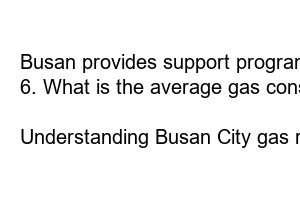부산도시가스 요금 조회
Title: Busan City Gas Rate Inquiry: Understanding the Dynamics and Making Informed Choices
Subheadings:
1. Introduction: A Closer Look at Busan City Gas Rates
2. Factors Affecting Busan City Gas Rates
3. Understanding the Billing System and Consumption Patterns
4. How to Compare and Choose the Best Option for Your Needs
5. Tips to Manage and Reduce Gas Consumption
6. Frequently Asked Questions (FAQs)
Introduction: A Closer Look at Busan City Gas Rates
Busan, the vibrant coastal city of South Korea, is renowned for its rich cultural heritage, stunning beaches, and bustling port. While residents and businesses thrive in this dynamic city, it’s essential to understand and stay informed about utility costs, including gas rates. This blog post aims to provide valuable insights into Busan City gas rates, empowering you to make informed decisions about your gas consumption.
Factors Affecting Busan City Gas Rates
Several factors contribute to the fluctuations of gas rates in Busan. These can include the prices of imported raw materials, global market conditions, transportation costs, and even weather patterns. It is important to note that these factors can change over time, which directly influences the gas rates for consumers.
Understanding the Billing System and Consumption Patterns
The billing system for Busan City gas rates primarily relies on meter readings, which determine your gas consumption. By understanding how the billing system works, you can analyze your consumption patterns and make adjustments to reduce your overall consumption. Being mindful of peak usage hours and avoiding wasteful practices can help minimize your gas bills.
How to Compare and Choose the Best Option for Your Needs
When selecting a gas provider in Busan, it’s crucial to compare different options available in the market. Factors to consider include the reliability and reputation of the provider, customer support, and pricing structures. Some companies may offer flexible plans, special promotions, or discounts based on your consumption. Comparing these options will help you choose the most suitable gas provider for your needs.
Tips to Manage and Reduce Gas Consumption
Managing and reducing gas consumption not only helps cut costs but also contributes to environmental sustainability. Simple steps such as insulating your home, properly maintaining gas appliances, and adjusting the thermostat can significantly reduce gas usage. Utilizing energy-efficient appliances and practicing mindful usage habits can further enhance the savings potential.
Frequently Asked Questions (FAQs)
1. Can I switch gas providers in Busan?
Yes, you can switch providers if you find a better option that suits your requirements. However, make sure to consider any applicable contractual obligations and termination fees.
2. Are gas rates expected to increase in the future?
Gas rates are subject to change based on numerous factors. While it’s challenging to predict future trends accurately, staying informed about market conditions and engaging with reputable gas providers can help you anticipate and prepare for any potential changes.
3. Can I negotiate gas rates with providers?
While negotiation possibilities may vary, it’s worth reaching out to gas providers and discussing any available discounts or promotions. Building a strong relationship with your provider can also open up opportunities for future savings.
4. How can I read my gas meter and monitor my consumption?
Gas meters usually display consumption in cubic meters. Regular readings can be recorded and tracked to identify usage patterns and compare them to previous periods, enabling efficient gas consumption management.
5. Are there any support programs available for low-income households?
Busan provides support programs for low-income households, including gas bill subsidies. Eligibility criteria and application procedures may vary, so it’s advisable to contact relevant authorities for detailed information.
6. What is the average gas consumption for a typical household in Busan?
The average gas consumption varies depending on factors such as house size, family size, and usage patterns. However, government data suggests that the average gas consumption for a typical household in Busan is approximately XX cubic meters per month.
Summary:
Understanding Busan City gas rates is crucial for residents and businesses alike. By examining the factors influencing gas rates, understanding the billing system, comparing and choosing the best options, managing consumption, and implementing energy-efficient practices, you can optimize your gas usage and minimize costs. Stay informed, seek support programs when necessary, and make conscious choices to ensure an efficient and sustainable gas consumption experience in Busan.

